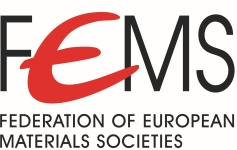Meet the 2023 FEMS Master Thesis Award finalists
The FEMS Master Thesis Award final will be held on Wednesday 6 September (14:30 CET, Room HZ14) during FEMS EUROMAT 2023. Four finalists, winners of their national FEMS Master Thesis finals will give a 10-minute presentation and answer judges' questions to become the overall winner.
Valentina Trombetta (AIM)
Effect of starch gelatinization and particle size distribution on mechanical properties of jarosite-blast furnace sludges self-reducing briquettes
Self-reducing briquettes represent one of the possibilities to convert metallurgical waste into low grade iron. To guarantee the required briquettes' mechanical properties, the present study showed that a full starch grlatinization is findamental. Furthermore, a heterogenous size distribution of jarosite and blast furnace sludge improves the poders compaction mechanism.
Chrysanthi Gkili (HSSTCM) 3rd Place
Stability of the passive state of Ta in the presence of halides and the role of electron transfer processes and the growth of polyaniline thin films
The thesis is focused on the stability and the electrochemical behavior of Ta2O5 formed on Ta via anodization. A point defect model is used to explain the higher susceptibility of Ta2O5 to the bromide- than chloride- breakdown. Electrodeposition of polyaniline on Ta leads to polyaniline-Ta2O5 electrodes with improved supercapacitive behavior.
Ester Lopez (SOCIEMAT) 2nd Place
Active protection of aluminium alloys
Highlights:
- Successful development of smart coatings on alloy 2024.
- All coatings improved corrosion behavior by 3 or 4 orders of magnitude.
- The coatings show active protection.
- Controversial effect of Ce.
- 1 research article about to be published in Prog Org Coard (Q1, D1)
Lara Catarina Lopes Castanheira (SPM) Winner
The production of sustainable powders for direct energy deposition
Upcycling stainless-steel alloy chips left from subtractive processes. Optimization of milling process to get the highest efficiency for the powder production as feedstock for additive manufacturing. Obtaining a defect-free interface between the printed material and a medium carbon steel substrate. Characterization of printer material and that of the interface.



